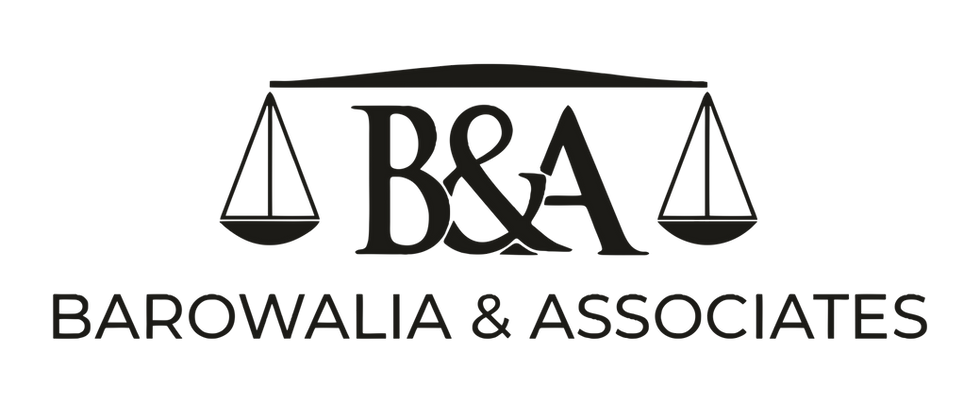What Is a Civil Suit for Damages and When Can You File One
- Barowalia & Associates
- Jun 12
- 3 min read
When someone suffers a financial or personal loss due to the wrongful act or negligence of another person, the law offers a way to seek compensation through a civil suit for damages. This is a formal legal process that helps the injured party recover the loss they’ve suffered.
In simple terms, if someone causes you harm—intentionally or by carelessness—you can ask the court to order them to pay you damages. Civil suits for damages are an important part of ensuring accountability in private relationships, contracts, and social dealings.
💡 What Are “Damages” in Civil Law?
Damages refer to monetary compensation awarded by a civil court to a person who has suffered injury or loss because of another person’s wrongful act. The idea is to restore the injured party, as far as possible, to the position they were in before the harm occurred.
Damages are claimed for wrongful acts that are not criminal, such as breach of contract, defamation, or negligence.
🧾 Common Situations Where Damages Can Be Claimed
Breach of Contract
If a person or company fails to fulfil terms of a contract (e.g., supply delays, failure to deliver goods), the aggrieved party can sue for the financial loss caused.
Property Damage
Causing harm to someone’s land, vehicle, or house, such as during unauthorized construction or due to negligence.
Defamation
Making false statements that harm someone’s reputation—whether spoken (slander) or written (libel).
Negligence
Failing to take reasonable care, causing harm—like a builder leaving a structure unstable, or a hospital making a careless error.
Personal Injury
Accidents caused by someone’s carelessness—like a workplace injury due to unsafe conditions.
Loss of Business or Opportunity
Wrongful actions that affect someone’s livelihood or business reputation, such as false blacklisting or abrupt contract termination.
Wrongful Eviction or Harassment
Forcibly removing a tenant or causing mental distress without following legal procedure.
Malicious Prosecution
Being wrongfully dragged into legal cases without valid grounds, causing financial and emotional harm.
⚖️ Legal Requirements to File a Suit for Damages
To succeed in a suit for damages, the claimant must prove:
Existence of Duty
The other party had a legal or contractual duty towards you.
Breach of Duty or Wrongful Act
That duty was violated through negligence, misconduct, or deliberate action.
Direct Harm or Loss
You suffered actual harm—financial, reputational, or emotional—due to their act.
Causal Connection
The harm must be a direct result of the breach or wrongful act.
📑 Types of Damages That Can Be Awarded
Compensatory Damages
Actual financial losses—like medical bills, lost income, or repair costs.
General Damages
For emotional pain, inconvenience, or loss of reputation.
Punitive Damages
Rare, but granted when the conduct was particularly wrongful or malicious.
Nominal Damages
A small amount awarded when a legal right is violated but no major loss occurred.
Liquidated Damages
A pre-decided amount in a contract that is payable if one party breaches the agreement.
📋 How to File a Suit for Damages
Consult an Advocate
Share full details of the incident, including all evidence—contracts, bills, photos, messages, etc.
Send a Legal Notice (Optional but Helpful)
Often, a legal notice is sent first to give the opposite party a chance to settle the matter. If they refuse, a suit can be filed.
Draft and File the Plaint
Your advocate will draft a plaint clearly stating:
The wrongful act
How it harmed you
What compensation you are claiming
Submit to Appropriate Court
The court is chosen based on:
Value of damages (pecuniary jurisdiction)
Where the act occurred (territorial jurisdiction)
Pay Court Fees
Fees are based on the amount of damages claimed and are payable at the time of filing.
Proceedings and Evidence
The opposite party will reply, and the court will examine witnesses, documents, and facts before passing judgment.
⏳ Limitation Period for Filing
Most civil suits for damages must be filed within 3 years of the incident. Delaying beyond this may result in dismissal, so it’s important to act promptly.
🧷 Practical Tips for Clients
Maintain all proof of loss—receipts, records, contracts, or witness statements
Avoid emotional claims—stick to facts and evidence
Be realistic in the compensation amount
Be prepared for settlement negotiations, which courts may encourage
Choose an advocate with experience in civil trial and damage evaluation
👨⚖️ Why Choose Barowalia & Associates
Barowalia & Associates has handled a wide range of civil suits involving damages—be it breach of contract, loss of reputation, or personal injury. The firm is known for its precise case-building, evidence-focused strategy, and effective advocacy in trial courts.
Clients benefit from:
✅ Detailed consultation to evaluate the strength of a claim
✅ Accurate calculation of compensation and future loss
✅ Transparent advice on legal costs and outcomes
✅ Step-by-step guidance through the litigation process
✅ Ethical and assertive court representation
If your rights have been harmed, Barowalia & Associates can help you claim what you rightfully deserve—legally, fairly, and efficiently.

Comments